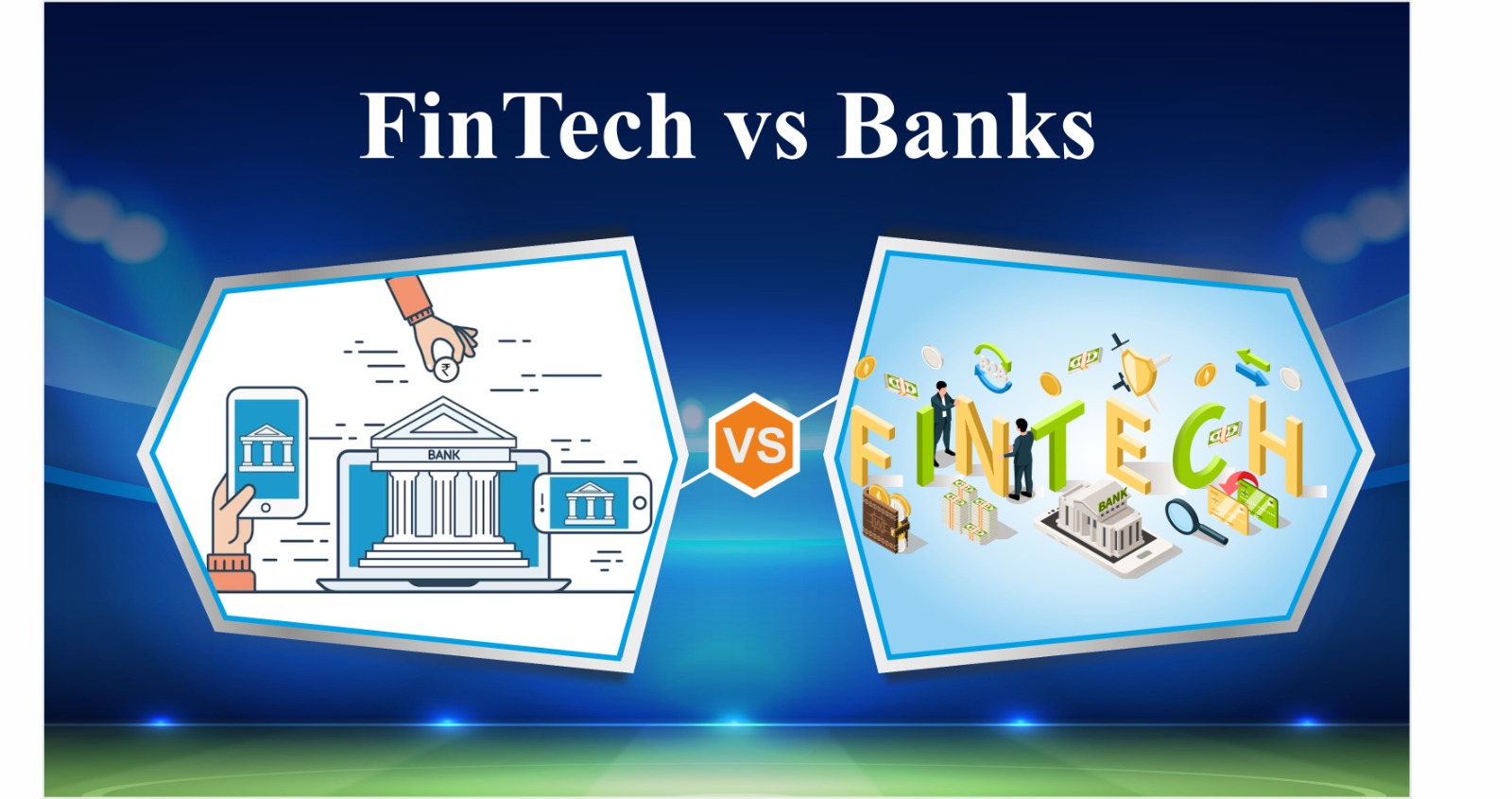FinTech vs Banks: Friends or Foe

Though launched in April 2016, UPI gained popularity much later in the year. What I believe is, demonetization in 2016, is what brought UPI to every threshold. The entire process of standing in long queues, depositing, and withdrawing cash from their bank accounts made people lean toward the FinTech innovation.
UPI and mobile banking have minimized the need of going to banks or ATMs to deposit, withdraw or transfer cash. Mobile banking and UPI Apps provide people with the comfort that physical bank branches don’t. People love comfort, don’t they? And that’s what the FinTech invention- mobile banking and UPI Apps offer them! Hence, the rise of the FinTech industry.
In recent years, the financial landscape has undergone a remarkable transformation with the rise of Financial Technology, or FinTech companies. The innovative FinTech startups, armed with advanced technologies and disruptive business models, have challenged the traditional banking industry. The clash between FinTech and banks has sparked debates about whether they are rivals or partners.
In this blog, we will explore the relationship between FinTech and banks, examining their dynamics in various contexts. Join us as we delve into the world of FinTech vs Banks: Cooperation or Competition?
FinTech vs Banks in India
India is a happening place for FinTech innovation! With lots of people using digital stuff, things are changing fast. Now we have cool digital payment platforms, where we can send money to our friends and family easily. There's also this thing called peer-to-peer lending, where we can borrow money from regular people instead of just banks. And guess what? We even have robo-advisors that can help us make smart choices with our money!
All these inventive new things have made traditional banks a bit nervous. They used to have a monopoly on all things money, but not anymore. FinTech companies have come in and used technology to make things more convenient for us. They listen to what we want and give us great solutions. This competition has made banks wake up and realize they need to change too. The competition between the two has forced banks to adapt and embrace digital transformation to stay relevant in the Indian market.
FinTech vs Traditional Financial Services
When we talk about FinTech and traditional financial services, the main difference is the use of technology. FinTech companies use advanced technologies like artificial intelligence, blockchain, and data analytics to make banking easier and more personalized for customers. They can improve things like customer service, make operations run smoothly, and offer customized financial solutions.
On the other hand, traditional financial services rely on older systems and sometimes have a harder time keeping up with the efficiency and flexibility of FinTech firms. But traditional banks have some important strengths too. They have a lot of customers, they know a lot about the rules and regulations in finance, and they have a well-established infrastructure in place. These things give them an advantage when facing competition from FinTech companies.
FinTech Banking vs Classical Banking
The rise of FinTech banking, also known as neo banks or digital banks, has brought in some new competition for traditional banks. FinTech banks are different because they operate only through digital channels, like websites and mobile apps. They make things really easy for customers by offering quick and smooth sign-up processes, faster transactions, and financial products that are customized to their needs. Because FinTech banks have fewer costs, they can pass those savings on to customers and reach people who don't have access to traditional banking services.
On the other hand, traditional banks still have physical branches that you can visit. Sometimes, they have a hard time keeping up with the speed and convenience that FinTech banks provide. But traditional banks have some edge too. They have been around for a long time, and people trust them because of their reputation for stability, which is a crucial factor for many customers.
FinTech vs Banking: Rivals or Partners?
Even though FinTech and banks used to be seen as competitors, things are changing. Now, they're starting to work together more often. Many banks have realized how much potential FinTech has, so they're teaming up with or buying FinTech companies. This way, they can improve their digital services and do more exciting things. These partnerships bring together the best parts of both worlds. Banks can use FinTech's clever ideas and flexibility, while FinTech companies get help from banks with things like rules and regulations and making customers feel secure.
Not only that, but the people in charge of making the rules for banking are also getting on board. They're starting to encourage banks and FinTech companies to work together more. They want to create an environment where customers have lots of different financial services to choose from. So, by working together, FinTech and banks can give people even more options and make things better for everyone.
FinTech vs Banks: Cooperation or Competition?
In reality, FinTech and banks have a relationship that involves both working together and competing. They compete to get customers and be successful in the market, but they can also benefit from working together. Banks can learn from FinTech companies and use their expertise to make their digital services better. At the same time, FinTech companies can use the resources and support of banks to grow their business and be more trustworthy.
Another important thing is that banks have a lot of information about their customers. When they share this information securely with FinTech companies, it can lead to financial solutions that are more personalized and specific to each person's needs.
In the end, the key is finding a balance between working together and competing. This way, both FinTech, and banks can do well and keep up with the changes happening in the financial world.
FinTech Vs Banks: What’s the future?
The relationship between FinTech and banks is a lot more complex than it seems. Although they may have started off as competitors, it's becoming clear that they can help each other and grow together. Technology is advancing fast, and FinTech companies are using it to come up with new and exciting solutions that meet the changing needs of customers. But banks have something important too—they have lots of experience and stability, and they know all about the rules and regulations.
Instead of seeing each other as rivals, banks, and FinTech companies are starting to see the value in working together. When they team up, they can combine their strengths and create a powerful group that benefits customers and the whole financial industry.
FinTech companies are great at things like mobile payments, peer-to-peer lending, and robo-advisory services. They make things more convenient and accessible for a bigger group of people. On the other hand, banks have earned the trust of customers over time. They have big networks and know a lot about how things are regulated.
When banks and FinTech companies collaborate, they can come up with amazing new financial products and services that meet the changing needs of customers. We've already seen successful partnerships where banks incorporate FinTech solutions into their existing systems. This makes their digital services better and helps them reach even more people.
Collaboration also lets banks take advantage of the creativity and innovation that FinTech startups bring. By working together and sharing ideas, banks can stay ahead of the game and keep getting better.
Therefore, the relationship between FinTech and banks is no longer about competition. They're recognizing each other's strengths and working together to grow and make things better for customers. With collaboration and their unique expertise, they have the power to shape the future of finance and make it more inclusive, efficient, and focused on what customers need.


